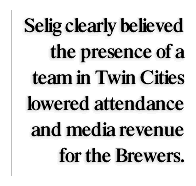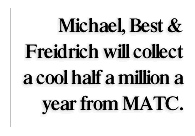Could The Brewers Benefit If Minnesota Loses Its Team?
Baseball commissioner Bud Selig has scoffed at complaints from Twin Cities newspapers that eliminating a baseball team there would benefit the Milwaukee Brewers. Selig called this “outrageous and not worthy of comment.”
 His daughter Wendy Selig-Prieb, CEO of the Brewers, piled on more scorn, declaring, “anyone who has a grain of understanding about this business realizes how absurd this is.”
His daughter Wendy Selig-Prieb, CEO of the Brewers, piled on more scorn, declaring, “anyone who has a grain of understanding about this business realizes how absurd this is.”
Really? That would suggest Bud Selig, circa 1994, knew nothing about baseball. That year, when I interviewed him about the Brewer’s need for a new stadium, he complained the team’s TV market was constrained by the presence of ball clubs in Chicago and Minnesota. Selig often lamented that, because the Brewers’ media market is so small, they have one of the poorest TV deals in Major League Baseball.
But Selig went further in the interview, talking about the crowds of fans the old Milwaukee Braves drew, because there was no team then in Minneapolis. “They came from the Dakotas and Minnesota here,” Selig said. “Busloads came from Twin Cities and western Wisconsin, even from Iowa.”
In fact, the Braves set records for attendance that the Brewers were never able to approach until last year, with the building of Miller Park. Selig clearly believed the presence of a team in the Twin Cities was one reason for the difference.
Milwaukee Journal Sentinel reporter Don Walker, in writing about the contraction controversy, concluded, “the addition of the Minnesota market would not drastically change the amount of revenue the Brewers would receive [on its TV contract].” Walker, however, offered no data or analysis to back up his point.
That said, I do not believe Bud Selig would back the elimination of a team in Twin Cities to benefit the Brewers. The real motivation is that Minnesota opposes a government bailout for its baseball team. That is anathema to Major League Baseball and its commissioner and may ultimately condemn the Twin Cities to franchise-less purgatory.
Legal Pull at MATC
Milwaukee Area Technical College knows who to call when there’s a legal problem. The Michael Best & Freidrich law firm has become the answer to all of its needs. The firm had been on a monthly retainer of $36,000, but has just signed an agreement increasing that by $7,500, meaning it can count on billing MATC $43,500, or a cool $522,000 a year until June, 2003, when the current agreement runs out.
 That, moreover, is simply the minimum the law firm can count on. MATC sometimes asks the firm to do additional work, so the firm was able to bill $48,550 for the month of June, $49,753 for July, and $45,700 for August.
That, moreover, is simply the minimum the law firm can count on. MATC sometimes asks the firm to do additional work, so the firm was able to bill $48,550 for the month of June, $49,753 for July, and $45,700 for August.
The MB&F lawyer handling the account is Jose Olivieri, who was said to have a very good relationship with former MATC president John Birkholz. “Birkholz thought Oliveira could walk on water,” says one insider.
Olivieri modestly denies this. “I can’t walk on water,” he assures me. But he adds, “I’ve had a good relationship with many of the people at MATC, including John Birkholz.”
Olivieri, in fact, has done very fine at building relationships in town. He serves on the board of the Greater Milwaukee Foundation, the Milwaukee Public Library Foundation, UW Board of Regents and the United Community Center.
Rob Hartung, a spokesperson for the school, says MATC had in years past used several law firms to handle various needs, but in recent years has consolidated them all under Olivieri’s roof. “That particular contract went through a formal RFP. It’s a competitive process.”
Among the four firms who lost out were Quarles & Brady and Cook & Franke. Does this mean they, gasp, wanted to charge more than a half million? Not necessarily. The selection process MATC used put most of its weight on factors beside price, including the firm’s experience handling such matters, its legal and support services and its ability to comply with MATC’s litigation philosophy.
We didn’t have the heart to ask what the philosophy is.
Short Takes
A recent story in which Mayor John Norquist criticized school board members Peter Blewitt and Jennifer Morales for “whining” and making excuses about the schools’ performance was small potatoes, but there were some unspoken issues behind the story. Norquist was instrumental in sweeping out a slate of union-backed candidates several years ago, but in the last election appeared to do nothing to get his ally, former School Board President Bruce Thompson, re-elected. (Thompson was defeated by Morales.) Suddenly, Norquist is refocusing on the school board, which is badly divided between pro-union and anti-union people. The mayor could be an important force in any future election that decides which way the board swings.
As for Morales, she might want to work on her sound bites. To Norquist’s charge that she is using a lack of money to excuse poorly performing schools, and is undermining Superintendent Spence Korte, she replied, “it’s beneath my dignity to respond.” She had a golden opportunity to present her side of these issues and said nothing.
All Tommy All The Time: Some lobbyists in Madison are grumbling about the incessant coverage of Tommy Thompson on the Wispolitics.com website. The site even included Thompson in a statewide poll of public opinion, though the Tomster is long gone as a state politician. The grumblers point to the fact that Phil Prange, Thompson’s former fundraiser, is the money behind Wispolitics. But Prange scoffs at the Monday morning quarterbacking. “I don’t do any content. I don’t have any input into the editorial,” he says.
Blue Slip Special
Besides junking the caucus staff system, the state assembly and senate are reportedly eliminating the use of blue slips, which are given to legislators if they testify before a particular committee. An obscure part of federal and state income tax law allows legislators to claim an exemption for any time they travel more than 50 miles to the capitol, including for any appearance before committees. (For an in-depth look at how that works, see our past article, “The Sad Saga Of Steve Nass.”) Some legislators would grab a fistful of blue slips, and claim all sorts of committee appearances they actually never made. But we’re cleaning things up in the capitol, dammit, and that tomfoolery will no longer be allowed.
This article was originally published by Milwaukee World.
Murphy's Law
-
National Media Discovers Mayor Johnson
 Jul 16th, 2024 by Bruce Murphy
Jul 16th, 2024 by Bruce Murphy
-
Milwaukee Arts Groups in Big Trouble
 Jul 10th, 2024 by Bruce Murphy
Jul 10th, 2024 by Bruce Murphy
-
The Plague of Rising Health Care Costs
 Jul 8th, 2024 by Bruce Murphy
Jul 8th, 2024 by Bruce Murphy





















